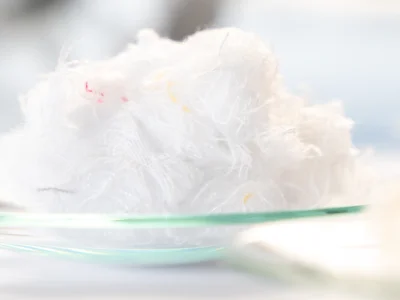Global textile fibre production amounts to around 134 million tonnes per year, corresponding to roughly 100 billion garments. Yet, only about 1% of textiles are currently recycled to new garments — mainly because the required technologies are simply not yet available.
The Josef Ressel Centre ReSTex (“Recovery Strategies for Textiles”), funded by the Christian Doppler Research Association, addresses this pressing challenge for a sustainable society: developing solutions for effective textile recycling.
Data and Facts
What is the duration of this project?
moreProject duration: 2023 to 2028
In what ways is ReSTex research actively incorporated into university teaching?
moreTwo PhD dissertations are in progress.
- Nika Depope at TU Vienna develops a green solvent that efficiently separates polyester and cotton — a patent pending process.
- Jeannie Egan at investigates at the Biotech Campus Tulln how cotton can be separated from polyester using enzymes.
Felice Quartinello is a postdoctoral researcher in the project. He supervises students and successfully finds ways to make the enzymes work even more efficiently.
These studies are supplemented by so far ten master’s students, working on topics such as circular design, life-cycle analyses, spectroscopy, machine learning, and enzyme technology.
How many people are involved in the research?
more20 researchers / project staff

Exhibition “More Than Recycling” at the Technical Museum Vienna
The Josef Ressel Centre ReSTex displays mechanically recycled polyester fractions from cleanroom clothing and recycled polyester granulate obtained from them. These exhibits were prepared in cooperation with the project partners Salesianer Group, Starlinger & Co GmbH, and EREMA Group. The exhibition furthermore illustrates key technologies of the ReSTex project, including spectroscopic methods for identifying textile fibres and the use of artificial intelligence for sorting and analysis. The displayed exhibits provide insight into innovative approaches to textile recycling and demonstrate the potential of new recovery strategies in the service of sustainable circular economy.
The exhibition “More Than Recycling” is on view until end of 2026 at the Technical Museum Vienna.



















